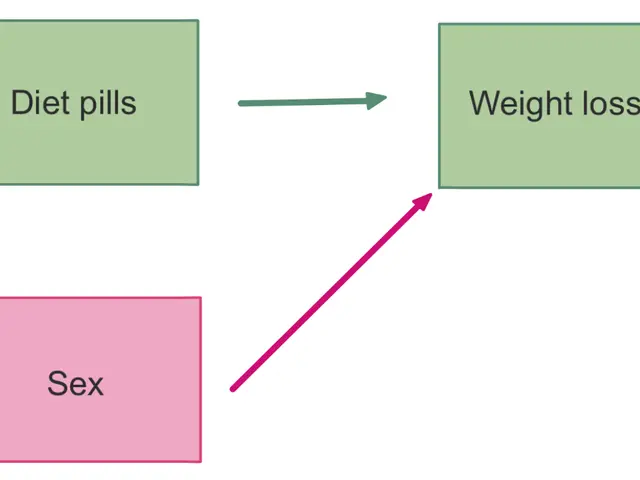Weekend Athleticism Linked to a Potential 33% Decrease in Diabetes-Related Mortality
For individuals living with diabetes, adopting a "weekend warrior" approach to physical activity—achieving the recommended 150 minutes or more of moderate-to-vigorous physical activity (MVPA) compressed into one or two sessions per week—could offer substantial protection against premature death and death related to cardiovascular disease. This groundbreaking discovery, published in the Annals of Internal Medicine, challenges conventional wisdom about the optimal exercise pattern for people with diabetes.
Dr. Cheng-Han Chen, a researcher involved in the study, emphasises the importance of promoting regular physical activity in the population to better control the burden of diabetes. People with either type of diabetes are at a high risk for health-related complications such as cognitive decline, foot issues, kidney damage, skin conditions, and heart disease.
The study addressed real-world barriers to exercise adherence, such as work schedules and family obligations, by examining the health benefits of a more flexible approach to physical activity. Researchers analysed health data from over 51,000 study participants with self-declared diabetes and an average age of about 60 from the United States. Participants were broken into four categories based on their MVPA: regularly active, "weekend warriors", insufficiently active, and inactive.
The findings reveal that people with diabetes who meet current physical activity recommendations, either through regular activity or a "weekend warrior" type of format, have a reduced risk for both all-cause mortality and cardiovascular-related mortality, compared to people who do not exercise.
Study participants who were regularly active had a 17% lower all-cause mortality risk and 19% lower risk of cardiovascular mortality, when compared to those who did not exercise regularly. "Weekend warriors" had an even more impressive reduction in mortality risks. They had a 21% lower all-cause mortality risk and 33% lower cardiovascular mortality risk when compared to inactive participants.
Insufficient activity (less than 150 minutes per week) still conferred some reduction in all-cause mortality risk (around 10%) compared to inactivity but was not significantly protective against cardiovascular mortality. However, people with type 2 diabetes who do one or two sessions of exercise per week may have a 33% lower risk of cardiovascular mortality.
Dr. Aaron Feingold, another researcher involved in the study, comments that the findings challenge the conventional wisdom that exercise must be spread evenly across the week to be maximally beneficial. He adds that this research is crucial because cardiovascular disease remains the leading cause of death in patients with diabetes.
Lifestyle modifications like physical activity are often more accessible and have fewer side effects than pharmacological interventions for people with diabetes. The next step is to validate these findings using objective measures of physical activity, such as wearable devices or digital health apps. Dr. Feingold states that concentrated weekend activity can still deliver substantial cardiovascular protection for people with diabetes who struggle with time constraints.
In summary, for people with diabetes, the weekend warrior approach—a condensed but sufficient amount of weekly exercise—provides substantial protection against premature death overall and death related to cardiovascular disease, comparable to more frequent exercise patterns, and superior to being inactive or insufficiently active. This highlights a flexible option for physical activity that can fit various lifestyles without compromising mortality benefits.
- The weekend warrior approach, compressing recommended physical activity into one or two sessions per week, could significantly reduce the risk of premature death and cardiovascular disease for individuals with diabetes, according to a study published in the Annals of Internal Medicine.
- Dr. Cheng-Han Chen, involved in the study, positions the promotion of regular physical activity as crucial towards managing the burden of diabetes, owing to the high risk of health-related complications linked to diabetes, such as heart disease.
- The research analyzed data from over 51,000 participants with self-declared diabetes, categorized based on their moderate-to-vigorous physical activity (MVPA) level, revealing a reduced risk for both all-cause mortality and cardiovascular-related mortality for those meeting physical activity recommendations.
- People with diabetes who engage in regular physical activity or a "weekend warrior" format show a lower all-cause mortality risk of 17% and 21%, respectively, when compared to inactive participants, highlighting the substantial benefits of this more flexible exercise approach.
- Study findings challenge the conventional wisdom that exercise must be consistent throughout the week for optimal benefits, providing hope for people with diabetes who may struggle with time constraints and real-world barriers to exercise adherence.
- The analysis revealed that even occasionally active individuals have a reduced all-cause mortality risk, but a concentrated weekend approach may provide an additional 33% lower risk of cardiovascular mortality for those living with type 2 diabetes.
- Lifestyle modifications like physical activity are often more accessible and have fewer side effects than pharmacological interventions, making it essential to further validate these findings using objective measures of physical activity and ascertain whether concentrated weekend activity maintains its substantial cardiovascular protection for people with diabetes.







